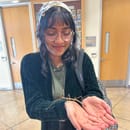This Sunday marks Diwali, one of the most important and widely celebrated Indian holidays. Diwali is often also called the “festival of lights,” as it is celebrated by lighting rows of clay lamps called diyas. It symbolizes the victory of light over darkness, knowledge over ignorance, and goodness over evil.
There are many different origin stories for Diwali depending on the geographic region and religion of those celebrating. I personally grew up hearing that Diwali originated from the Ramayana, a poem that is thousands of years old and still largely influential in Hinduism today. It tells the story of Prince Rama, a human incarnation of the god Vishnu, who was unfairly exiled from his kingdom of Ayodhya for 14 years. It’s said when he arrived home, the people of Ayodhya lined all of the streets with burning diyas to symbolize the light of his return.
Today, there are a variety of ways families celebrate Diwali together. Lighting candles and lanterns is a common theme, as is setting fireworks. Huge meals are cooked and households are filled with desserts for days after. Front porches are covered in rangoli, which are elaborate designs made from sand, colorful powder, and flowers. One of my family’s traditions is buying plain diyas and painting them together. Since most of my immediate family live abroad, I also love teaching and sharing these celebrations with my non-Indian friends.
For many Indian Americans, especially those of us who were born and raised in the US, it can be difficult to find a balance between our Indian heritage and American culture. In my childhood, I remember being more excited about holidays like Christmas and Thanksgiving than I was for Diwali, simply because I didn’t have as much exposure to Indian celebrations. As I got older, moving to a more diverse area has helped me take pride in my culture while learning more about others’ as well. Seeing how Indians like myself choose to honor their mixed cultures in their own personal ways is inspiring.
Although everyone’s way of celebrating looks different, the one thing I strive to do every Diwali is keeping in mind the reason behind the celebration: the struggles of goodness against evil, both historically and in our everyday lives. Being able to self-reflect during Diwali helps me foster growth in myself while celebrating my heritage, both of which are values very important to me. Diwali reminds me that despite the challenges we face, or perhaps even because of them, we can make the choice to embody what is right and have our own victories over evil.




